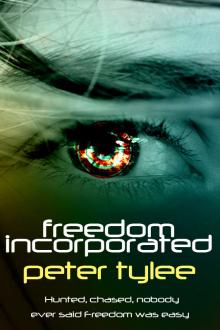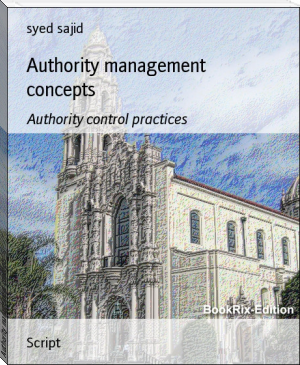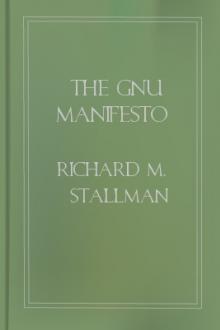Freedom Incorporated - Peter Tylee (best biographies to read TXT) 📗

- Author: Peter Tylee
- Performer: -
Book online «Freedom Incorporated - Peter Tylee (best biographies to read TXT) 📗». Author Peter Tylee
One to go. He was beginning to wonder whether he’d made a mistake during his database scan. Five to one it’s not her. Surely she’s not in Australia. The majority of his targets were scattered throughout North America and Europe. Australian targets were rare, and he’d never had two in a row before. A dangerous thought hovered on the edge of his mind. If it does turn out to be her, I hope the Raven doesn’t know she’s in Australia. He might try to economise on his travel. It brought a chill to his flushed cheeks and drained the colour from his skin.
A squad of drug police were leading a Labrador through the terminals. Despite advances in olfactory technology that enabled identification of individual microscopic particles, handheld scanners just weren’t as fun to work with as dogs. So they worked side by side. The Labrador’s wet nose sniffed the air and the every second the scanner classified thousands of airborne particles. They were both looking for anything illicit. The dog’s tongue lolled from its mouth and its big, happy, brown eyes were in stark contrast to the cold, tense, blue eyes of its handler. And the squad oozed business. Dan wondered why.
“What’s going on, Chuck?” Dan asked the customs officer as he placed his unloaded pistol in the special tray for inspection.
Christopher Delaney, or Chuck as his friends knew him, snorted in reply. “Some arsehole had a condom of heroine burst in his stomach. He didn’t even make it to the counter; he just dropped dead. About fifteen minutes ago.”
Dan frowned. “They must be getting desperate.”
“You’re not wrong there. We’ve had a threefold increase over the same period last year.”
“So I guess it’s working then?” Dan raised an eyebrow and collected his weapon after passing through the scanner. For once, it didn’t go off. He had clearance to carry ammunition and an unloaded weapon into and out of the country, all thanks to the bounty-hunter certificate loaded on his chip. Besides, he was such a regular traveller that he’d become good friends with Christopher Delaney, and he knew several other terminal workers by name too.
“I wouldn’t be so sure.” Chuck lazily eyed the baggage that scrolled lethargically across his monitor. “A neighbour of mine had a son who died last week from the shit.”
“I’m sorry to hear that.” Dan didn’t know what else to say. He never did.
“Yeah.” Chuck’s smile looked wan. “So was she. They said he knew what he was doing too. He’d been addicted for years so he knew exactly how much to shoot up.” He lowered his voice as if discussing something taboo. “I guess he just woke up one morning, realised what he was, and decided it was time to punch his own ticket.” He slowly shook his head. “My neighbour was understandably distressed. She’d been fighting to get him clean for God knows how long.”
“Maybe now she can lay him to rest, grieve for her loss and pick up what’s left of her life.” But Dan said it half-heartedly; he knew how hard it was to pick up the pieces of a shattered life. He’d been trying for eleven months and didn’t feel any closer to a rebuilt life than he had on day one. Still, he wished well for others. He occasionally needed to hear a success story to believe there was still hope for him.
“I doubt it.” Chuck was barely whispering. “Xantex’s prescription didn’t work fast enough and she did herself in too.”
Dan swallowed hard, understanding all too well the way she felt. “Then I hope she finds peace.”
It wasn’t what he needed to hear. It sapped his strength.
The Australian government, whether through efficiency or carelessness, had combined the roles of immigration, customs and security. Dan wished other countries would do the same; it made things easy on travellers. So, now that Chuck’s scanner had logged Dan’s details, Dan was free to enter the county. They each nodded farewell and Dan headed to the domestic portals where he selected his home address. He was thinking about the final entry on his list. I’m tired so you’ll have to wait a while. He scowled. If it’s you at all.
I wake up every morning, jump in the shower, look down at the symbol, and that pumps me up for the day. It’s to remind me every day what I have to do, which is, “Just Do It.”
24-year-old Internet entrepreneur Carmine Colettion on his decision to get a Nike swoosh tattooed on his navel, December 1997.
Thursday, September 16, 2066
Elustra Giga-Mall
14:44 Melbourne, AustraliaThe mall was crowded.
It always was. Such was the price to pay for living in the hub of the thirty-seventh Elustra undertaking. It truly was impressive; Jen had to admit that. A little over the top though. It was an Elustra committee brainchild - that’d wanted to increase efficiency. It chilled Jen to think of them sitting around a conference room, scoffing hors d’oeuvres, downing Champaign and concocting their plan for the Elustra Giga-Mall. The complex was actually three enormous columns arranged in a triangle with an artificially maintained garden in the middle. Each pillar was a staggering testament to the accomplishments of civil engineering. They each occupied three square-kilometres of earth - made brackish due to the raising water table - and each rose 125 stories into the sky. The tubes and connecting tunnels that linked the three pillars resembled the feeding and refuse tubes of a hospitalised monster.
The primary pillar was the epicentre of the Elustra world. It was a credit-maniac’s nightmare and a kleptomaniac’s delight. An array of retail stores, all operated by the colossal giga-corporation, catered for every conceivable desire. Jen frowned and tried to think of something Elustra had forgotten but couldn’t. There were 400 food stalls, 60 restaurants, and 7 department stores - all with names based on the Elustra trademark: Little Elustra, Big Elustra, Lustre, Lust Elm, Elustra Cute, Mini Elustra, and Gigantic Elustra. Jen had lost count but the information board proudly boasted there were 16 cinemas, 5 supermarkets, 90 clothing stores, 17 chemists, 18 hairdressers and over 300 other specialty shops selling everything from ‘antiques’ to computer games.
Impressive. Jen begrudgingly admitted. If she couldn’t find something on the outside, she knew she’d find it here - Elustra guaranteed it. As one of their favourite advertisements said, “If you can’t find it at Elustra, it doesn’t exist.” Jen believed it. And the convenience! Jen marvelled that they could operate every store in the mall for 8,760 hours a year. 8,784 hours in a leap year, Jen remembered. They’d built their business on pure, unadulterated capitalism. And Jen was standing at the pinnacle. It frightened her a little and she could see a similarly uneasy expression on Samantha’s face.
The second Elustra pillar housed the management team’s offices. A few years ago it had featured in Fortune magazine, which reported it to have the most luxurious offices money could buy. And that had been the case until the other giga-corporations matched Elustra’s grandeur to stem the tide of quality staff they were losing to the giant retailer’s extravagance. Jen couldn’t remember how many offices the building hosted and couldn’t be bothered sitting through one of the information screenings to find out. The boring presentations ran in a loop, 24 hours a day.
The final pillar housed the residences, everything from one-bedroom bachelor pads to expansive executive homes. Elustra had spared no expense. The building materials, workmanship, finish and fittings were all first class. They’d even soundproofed the walls to give every resident the sensation they were in a freestanding house. Or so they say. Jen had never heard a firsthand resident’s account, probably because their contracts forbid them to disclose company secrets. Every resident over the age of eighteen was an employee, and the Elustra Foundation thoroughly indoctrinated the teenagers who were approaching legal working age. As a result, they tended to fight ferociously to keep a position in the company, even if that meant doing menial work such as scrubbing the scum off the nest of pipes in the basement.
It was the perfect biosphere to hawk wares. Jen knew it, Samantha knew it, and most of the people living there knew it. But that was what they wanted. Or that’s what Elustra had contracted them to say if anybody asked. Jen wished she had an information pipeline into the giga-mall, but the iron-fisted approach taken by Elustra’s infamous security force made that impossible. And it was rare to find an Elustra employee in the outside world; they had no need of that anymore. They lived branded lives, Elustra Lives. What need did they have of the outside world? Didn’t Elustra supply everything they could possibly want?
Openings at an Elustra mall occasionally appeared in the online papers and Jen wondered what sort of people would actually apply for them. Nevertheless, there was a wide variety of positions available: office juniors, highly paid and overstressed executives, cleaners, security guards, building maintenance orderlies, doctors, dentists, medical specialists, engineers to keep the sophisticated equipment in proper working order… Elustra needed them all to keep their workforce healthy, to keep it free of decay. But the advertisements never mentioned the burnt-out employees Elustra discarded, thereby creating the vacancies.
With such a large structure, transportation could prove a problem. Or it would prove a problem if Elustra hadn’t put portals everywhere. They were free for all residents - one of the perquisites of having a microchip branded by an oppressive corporation. The portals positively riddled the structure, though somebody could only access the areas for which he or she had the appropriate clearance.
And one of Elustra’s manufacturing plants had fabricated every product in the mall -including the ‘antiques’. But the factories didn’t have a shiny enough public image, so they’d never been a candidate for integration with the perfectly balanced triangle. Elustra brushed them to the fringes where they occupied deserts and swamps, operated in sweatshop conditions wherever the local laws were lax enough to permit it.
The business model had proved successful; Elustra’s pilot program in Los Angeles demonstrated that. It was so successful that they began stamping out malls as fast as their construction crews could find the materials. They scattered the first ten across the United States where the newly enlisted Elustra employees welcomed them wholeheartedly and everyone else eyed them with suspicion. The fact that Elustra only built malls on cheap, unwanted land was probably what helped them survive their youth. Who needed to be close to the cities when your patrons could portal from anywhere? So their enormous triangles, which looked more like huge turds from a distance, multiplied without resistance. Their introduction into Canada and Australia went smoothly, but the Europeans complained bitterly about the decimation of their old-world skyline and protests rocked the streets until Elustra relocated to Russia, where they weren’t so finicky about outward appearances. In order to compensate for the added cost of long distance portaling, Elustra subsidised all portal activity from Western Europe into their Russian malls. It worked. Europeans flocked to Elustra’s malls and brought their money with them.
A flood of money.
It was hardly surprising that other multinationals sought to copy Elustra’s success and soon the gargantuan developments speckled the globe. Every multinational attempted to diversify, preying upon vaguely dissimilar segments of society. But Elustra was the original model and it would always hold a special place in the hearts and minds of the people.
For Jen, that special place was a stinging clot that choked her of oxygen.
Samantha looked





Comments (0)